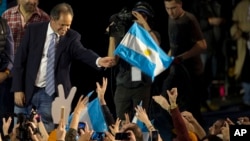Argentina's presidential election is likely to be battled out in a tight run-off vote after Sunday's party primaries indicated ruling party candidate
Daniel Scioli would struggle to win outright in the first round.
The prospect of a head-to-head between Scioli and his more business-friendly rival, Mauricio Macri, sent Argentine bond prices higher, with defaulted U.S. dollar discount bonds hitting a two-month high.
Macri has promised to unravel swiftly outgoing President Cristina Fernandez's controls on the economy to free up the market, while Scioli has pledged gradual change and vowed not to destroy Argentina's strong social safety net.
With 94 percent of votes counted, official results showed Scioli and the ruling Front for Victory winning 38.40 percent while Macri's Let's Change alliance secured 30.10 percent of votes.
"With these results a ballotage looks most probable," said political analyst Fausto Spotorno.
Argentina's primaries provide an accurate account of public opinion ahead of the first round of the election on October 25, with voters able to nominate a candidate across party lines.
Bonds rise
As the final results trickled in, Argentina's defaulted 2033 U.S. dollar Discount bonds rose as much as 1.47 percent to a two-month high of 100.917 before easing off, Thomson Reuters data showed.
U.S. dollar-denominated Par bonds due in 2038 climbed to a two-week high of 58.800 before falling back to trade at 58.650 at 9:53 a.m. ET, 0.2 percent up from Friday's close.
"Bond prices will continue to rise as the market views positively the likely ballotage between Scioli and Mauricio Macri," said Jorge Piedrahita, chief executive of brokerage firm Torino Capital.
In a speech late Sunday, Macri said he was "happy" with the outcome of the primary.
"An alternative path toward change in Argentina is consolidating," Macri told supporters.
Close contest likely
Opinion polls for a second round run-off are inconclusive, with different pollsters showing Scioli and Macri winning what would likely be a close contest.
How the votes of third-placed candidate, dissident Peronist Sergio Massa, are split will be key.
Fernandez's interventionist policies have fueled one of the world's highest inflation rates, stunted investment into Latin America's No. 3 economy and stalled economic growth.
"The bigger picture is that some form of economic adjustment post-election will be inevitable," Edward Glossop, an economist at Capital Economics, said in an investor briefing note.
To win outright on October 25, a candidate needs 45 percent of the vote, or 40 percent with a 10-point margin over whoever places second.





